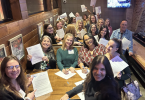A family’s value system is established early. When we were kids, our parents, teachers and other responsible adults taught us “right from wrong” either by lessons learned or by the observation of others’ actions.
According to Michael Josephson, founder and president of the Joseph & Edna Josephson Institute of Ethics, one of the central pieces of teaching children about ethics is that “parents need to have a focused notion of what values are important to the family.” Many of us grew up with family values. They were unwritten but unmistakably clear: Don’t lie, don’t steal, respect your elders and treat people the way you want to be treated. Simple, right?
Today, maybe not so much.
It’s been almost 68 years since the adoption of the original code and we are still facing the same ethical dilemmas that challenged the profession in the 1950s such as tax evasion, conflicts of interest, breach of contracts, misleading information and breach of confidentiality, to name just a few.
For some of us, the ethical dilemmas we deal with pale in comparison to what assaults our senses in a 24/7 news cycle. Personally, I don’t wake up in the morning faced with having to make decisions on the fate of the free world. The ethical dilemmas many of us confront daily don’t enter our professional lives screaming from the headlines. They may be subtle but can have large implications.
It might be the reporting of a fundraising goal that is truthful, but because of its complexity, not quite accurate. You could be the initiator of a negative and potentially damaging sidebar comment about another practitioner that stems from frustration over a project that was supposed to be collaborative. Then there is the hard line that separates the truth and something that resembles its off-center doppelganger. The truth is the truth, or so I’ve heard.
The Josephson Institute offers a wealth of information on ethical behavior. In its “Character Counts!” framework are six pillars of character identified by a nonsectarian, nonpartisan group of youth development experts in 1992 as “core ethical values that transcend cultural, religious and socioeconomic differences.” They are: trustworthiness, respect, responsibility, fairness, caring and citizenship.
Sound familiar? All things you should have learned as a kid, right?
If my parents were members of PRSA, then this is how they would break it down:
1. Free Flow of Information: Protecting and advancing the free flow of accurate and truthful information is essential to serving the public interest and contributing to informed decision making in a democratic society.
- Lesson: Tell the truth. (Remember Pinocchio?)
2. Competition- Promoting healthy and fair competition among professionals preserves an ethical climate while fostering a robust business environment.
- Lesson: Fight fair. Actually, don’t fight at all.
3. Disclosure of Information: Open communication fosters informed decision making in a democratic society.
- Lesson: Don’t hold information back, even if it may hurt someone’s feelings. When in doubt, refer to lesson one.
4. Safeguarding Confidences: Protect the privacy rights of clients, organizations and individuals by safeguarding confidential information.
- Lesson: Trust is earned. Don’t gossip or spread rumors.
5. Conflicts of Interest: Avoid real, potential or perceived conflicts of interest.
- Lesson: Be a “stand up” kind of person and have some integrity.
6. Enhancing the Profession: PR professionals work constantly to strengthen the public’s trust in the profession.
- Lesson: You should never stop learning.
The first Code of Ethics was adopted in 1950. It laid the foundation for integrity and honesty in our profession. The Code has gone through a few revisions since that time, adapting to the needs and challenges of our profession yet still grounded in a set of strong values. It is clearly articulated, and continues to act as a framework for acceptable behavior for practitioners whether they are members of PRSA or not.
Our work ethic, professional, and yes, personal lives, is a reflection of our values. If we don’t fully embrace it as an ethical compass — with all its complexities — we cannot educate or inspire those who look to us for wise counsel.
Students are watching. Our colleagues are watching. And, as trite as it sounds, the world is watching. We lead by example, and it’s our responsibility to lead with integrity.
It all goes back to what we learned as kids.
Anita Ford Saunders, APR, is a member of the PRSA Board of Ethics and Professional Standards.








This is a great and timely post. It makes me think about what I can do to ensure that I am teaching positive lessons to those younger than me. This way, when ethics are introduced later on, it is not a new idea when their believes and values have possibly been established previously.
I love this post! Thanks so much for this timely reminder during Ethics Month.
I love the parental comparisons. I plan to use this with the students in the PR class I adjunct teach when we tackle ethics in a couple of weeks. Thanks.
Love this. Tell the truth and follow the golden rule.
What a great post and the perfect way to close out a month of ethics. It’s interesting that simple things we learned so many years ago can still be of relevance to our professional lives today. This is the perfect comparison to remember to make ethical decisions in our careers and every day lives. -Gillian Castro, writer/editor for Platform Magazine
Thank you for sharing this content about ethics in the PR world! I found it very interesting and informative. I am a student studying PR and I am learning a lot about ethics. I do have a few questions. How does the industry enforce “caring?” Where is the line between disclosure of information and possibly destroying someone’s life? Thank you!